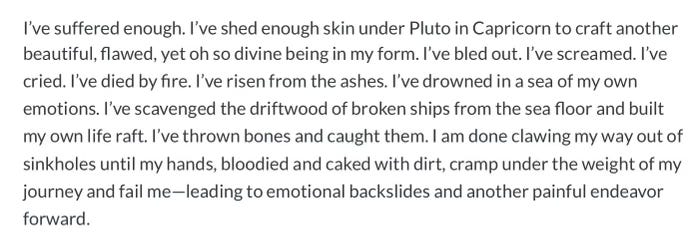
Saturn’s Daughter
Fragment #7 is a meditation on what it means to rest and heal when you feel hardwired to achieve relentlessly. I'm removing the paywall because 7 is my favorite number 🤭.
It’s January, and, like many of you, I’ve been in the throes of writing down what I want to accomplish in 2024. Less of my list has been focused on self-improvement than I expected. Of course, I have the typical, human goals: a more snatched waist, being more consistent with the routines that make me feel good, securing more career wins, and making more money since high-quality, systematic production of my creative prowess feels like the only way to survive inflation. (Money is never more important than the quality of the work to me, for what it’s worth. I’m also a realist, and groceries are expensive as fuck right now.)
More. That’s the word popping up in all of my thinking on this lately. I’m grateful for what’s here while I strive for more. But that’s the other thing: I am always striving for more, and I’m not sure how I feel about that anymore.
Most of the time, when I’m in a silly, goofy mood, I blame it on being Saturn’s Daughter. I’m a Capricorn Rising, meaning my chart is ruled by Saturn, a planet astrologically associated with discipline, ambition, grit, and perseverance. The ringed planet’s dominance is further boosted by a Libra stellium in my 10th house—the astrological sign of Saturn’s exaltation sitting within the house traditionally ruled by Capricorn if one’s chart follows the cadence of the astrological new year.
I am the salt-dusted sea goat. I crawl from the ocean depths to the top of mountains. I’ve done some version of this expedition at every stage of my life. Now, I think I’m ready to hang out at the peak for a while. Less grinding, more enjoying the fruit produced by three decades of labor. Or, as I wrote in a journal entry I don’t mind sharing:
None of this may make sense to you, and that’s okay. The TL;DR is that I’m an astro girlie, and Saturn’s stronghold over my astrology makes a lot of sense to me, playing into how intricately I’m currently thinking about rest and wellness as a means of self-preservation. What does sitting down look like when you’ve spent your entire life grinding? And how does can that coincide with the tenacity I hold dear to my ethos and being?
A well-circulated Audre Lorde quote about wellness has helped as I attempt to put this into perspective. The quote is from her book A Burst of Light and Other Essays, written as Lorde navigated what it was like to live with cancer. It’s been bastardized and chopped up to promote the vein of wellness that prioritizes aesthetics and consumption over committing to the deep work of healing. (It feels important to tell you I’m not anti-pretty wellness practices. We cannot believe it to be real self-love and care.) But in full, Lorde says:
I had to examine, in my dreams as well as in my immune-function tests, the devastating effects of overextension. Overextending myself is not stretching myself. I had to accept how difficult it is to monitor the difference. Necessary for me as cutting down on sugar. Crucial. Physically. Psychically. Caring for myself is not self-indulgence, it is self-preservation, and that is an act of political warfare.
I’m trying to see caring for myself as preservation, as the way I actually survive. I can’t keep running myself into the ground for productivity and labor—even if doing so feels correct, even if it feels like the only way to survive.
So many things in my life have been achievements. Healing wouldn’t be one of them. Such an intricate, painful process couldn’t be regulated to a checklist.
Caring for myself, resting, and healing didn’t register as critical for my longevity until late 2020. Before then, it was a modality I wasn’t interested in. I was accustomed to using healing practices—like therapy, yoga, meditation, and even boundary setting—as a way to barrel through my pain so I could move on to chasing the next dream. But, that September, I was paralyzed.
I didn’t know it then, but I was at the beginning of an almost four-year tumble—a time frame where I’d leave my job, become estranged from loved ones, land in a wicked mental space, lose faith in myself, be plagued by panic attacks almost daily, break up with a man I foolishly loved more than I cared for my own needs, and much more I don’t care to share.
My brain was mush, my emotions were muck, and I couldn’t think or exist very well. What was abundantly clear, however, was that my ambitious nature would not save me this same. So many things in my life have been achievements. Healing wouldn’t be one of them. Such an intricate, painful process couldn’t be regulated to a checklist. The only real way forward would be to surrender to what healing requires of us, to take on its responsibility and weight. Doing so hasn’t been easy, and it’s required me to dig deep and allow myself to be vulnerable, all while not dwelling in that muck.
I must admit there are days when I want to dwell on my shit. I want to rot into the ground alongside it. Dwelling is more manageable than taking up the work of being well—setting actual boundaries, loving who looks back at me in the mirror even if I don’t always like her, blocking phone numbers, ignoring emails, saying no. It’s easier than drilling through the hardened layers of my psyche, examining the cracks, discarding that broken stone, and fertilizing, instead of salting, my earth, preparing it for something new, something more robust, something better—something I ultimately will need to build upon, fortify, and protect for as long as I inhabit this plane even when I cannot conceptualize what it is I’m creating. Healing is backbreaking work. It is not passive; it can’t be.
During this time, I returned to The Salt Eaters, a novel that inspired this newsletter’s praxis shift. I was most taken by the scene where Velma realizes that her survival, her healing, hinged on learning “the difference between eating salt as an antidote to snakebite and turning into salt, succumbing to the serpent.”
Other quotes stood out to me, too:
Wasn’t that what happened to Lot’s Wife? A loyalty to old things, a fear of the new, a fear to change, to look ahead?
And:
A good cry, man. Good for the eyes, the sinuses, the heart. The body needs to throw off its excess salt for balance. Too little salt and wounds can’t heal. Remember Napoleon’s army? Those frogs were dropping dead from scratches because their bodies were deprived of salt. But too much—
You can have too much or not enough of anything and won’t function right because of it. Physically, low levels of salt in your blood can result in your body holding on to too much water. Too much sodium morphs your body into a pressure cooker, building and building until something gives. Your spirit isn’t much different.
Why had I been spending so much energy salting my soul? In those silly, goofy moods of mine, I believed it was because I am the sea goat, accustomed to excavating the briniest depths before clawing my way onto the beach and up the steepest edge of whatever mountain the universe placed in front of me. Like Lot’s wife, this was mine in life—and a new way of existing terrified me.
But life will always season me, and I’m learning I don’t need to seek out the shaker. Much less drown myself in the brine. What I must do, at least for a little while, is come up for air and lay out on the sand, rest, and let the salty waves wash my wounds clean.












